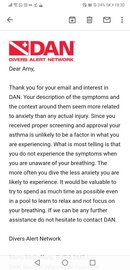Hello!
I am a new diver, with my only experience being pool sessions and one (awesome) aquarium dive for my birthday. I recently signed up for my open water course and started on it last week. I am seeking advice if possible on the following... After every dive I've done, I get a tight chestedness feeling and slight breathlessness. I do have mild controlled astmha but was signed off by a HSE dive doctor for this. I've been checked over by numerous doctor's, had a blood test, ecg, my lungs listened to etc and all came back clear/normal. So it's thought to be down to anxiety. I have noticed that when underwater, I am so aware of my breathing that I usually try to control it so much and it ends up all over the place. I then get a little shaky and finally nauseous, but nothing major. The thought of getting my breathing wrong also gives me a less intense version of the above. It's stupid I worry about getting things perfect/ not messing up or that I really don't want to get DCI or something nasty. I realise I shouldn't be so anxious or worrying about it all, because I really do enjoy the actual feeling of diving when I'm calm and have been told I'm good. What I would like to know please is what I can do to help improve this situation? Any breathing exercises at home, tips or personal experiences anyone might be able to pass along please?

I told my dive centre and the master instructor has told me he's really glad I told him and that he will go over just breathing with me soon. That I should also bring a wetsuit for the pool sessions and finally, to go into a group at a similar pace and level.
So I'll now be in a different group to who I was with.
Thank you so much everyone for your time. I think this community is really awesome

I do understand it's embarrassing to have this problem but I appreciate any help you may have
Amy





